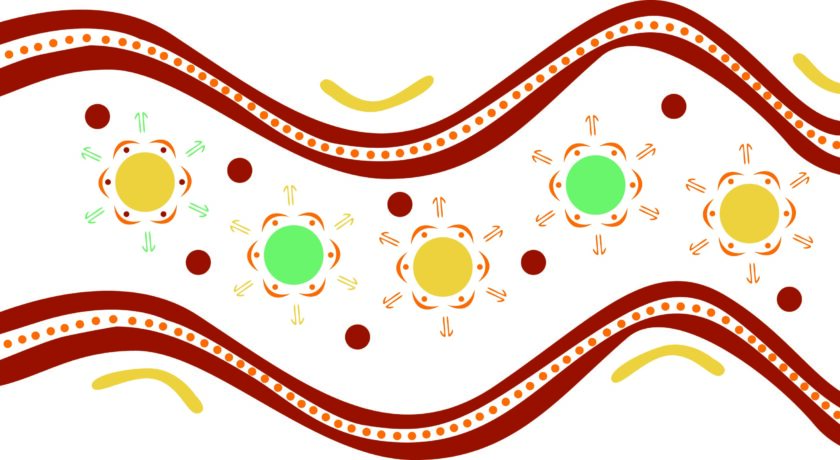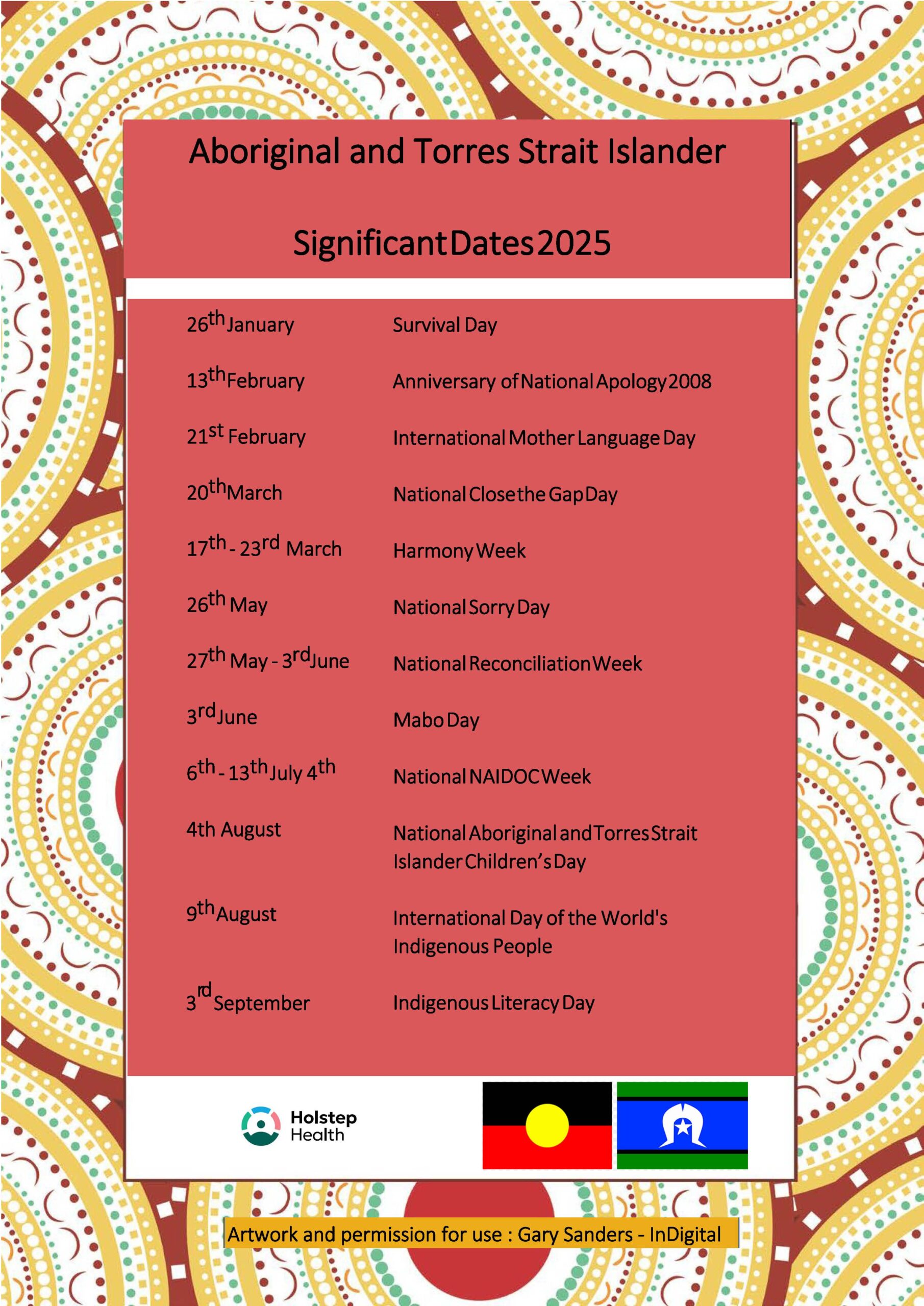
Click the image above to view or download the poster highlighting the Aboriginal and Torres Strait Islander significant dates for 2024.
For further details about each key dates, please check out the information below:
26 January ‐ Survival Day, Day of Mourning, Invasion Day
26th January 1788 is the day First Fleet commander Captain Arthur Phillip rowed ashore at Sydney Cove, raised the Union Jack and proclaimed British sovereignty over part of the continent in 1788. Aboriginal peoples had been living on the continent we now know as Australia for more than 60, 000 years, or 1600 generations.
The naming of Australia Day took almost 150 years and it was not always held on 26 January. The first “Australia Day” was actually held on 30th July 1915 to raise funds for the World War I effort. In the 1930’s Victoria began a campaign to have 26th January celebrated throughout Australia as Australia Day on a Monday, thereby making it a long weekend. On 26th January 1938, First Nations’ leaders met for a Day of Mourning to protest their mistreatment by white Australians and to seek the rights of full citizenship.
In 1988, Australia’s bicentennial year, the states and territories agreed to celebrate Australia Day on 26th January, rather than with a long weekend. First Nations’ peoples renamed Australia Day “Invasion Day”.
It is only since the establishment of the National Australia Day Council in 1994 that 26 January has become established as Australia Day. In recent years there have been growing calls for Australia Day to be held on a different date, in recognition that the arrival of the First Fleet and the colonisation that followed have been devastating for First Nations’ peoples.
Source: https://www.australiaday.org.au/about/history/
https://www.news.com.au/national/the-real-significance-of-australia-day/news-story/9f6446f9021c575bba1a2b733f2c0b80
13 February – Anniversary of National Apology 2008
This event marks the anniversary of the Apology in 2008 to Australia’s Indigenous peoples in the House of Representatives. The apology was made by former Prime Minister, Kevin Rudd for past laws, policies and practices that have impacted on Australia’s First Nations Peoples, particularly members of the Stolen Generations. The motion was supported by the Opposition and passed through both houses of Parliament. Many members of the Stolen Generations were present in the Chamber to hear the Apology and thousands more filled the Great Hall of Parliament House and flowed out onto the lawns to watch it on big screens. For more information visit the https://www.reconciliation.org.au/national-apology-anniversary/
21 February – International Mother Language Day
International Mother Language Day recognizes that languages and multilingualism can advance inclusion, and the Sustainable Development Goals’ focus on leaving no one behind. UNESCO believes education, based on the first language or mother tongue, must begin from the early years as early childhood care and education is the foundation of learning.
The threat of language loss poses a serious risk to Australia’s cultural inheritance, and to the wellbeing of many First Nations people. In Australia, there are estimated to be 250 Aboriginal and Torres Strait Islander languages, but only around 120 are still spoken. Of these languages approximately 90 per cent are endangered.
Australians can take action to improve the preservation, promotion and learning of First Nations languages across Australia. As a nation we can work towards an Australia where First Languages are respected nationally and spoken by community members across our country.
This year’s observance is a call on policymakers, educators and teachers, parents and families to scale up their commitment to multilingual education, and inclusion in education to advance education recovery in the context of COVID-19. This effort also contributes to the United Nations International Decade of Indigenous Languages (2022-2032), for which UNESCO is the lead agency, and which places multilingualism at the heart of indigenous peoples’ development.
Source:
https://www.commonground.org.au/article/2019-the-year-of-indigenous-languages#:~:text=The%20threat%20of%20language%20loss%20poses%20a%20serious,these%20languages%20approximately%2090%20per%20cent%20are%20endangered.
https://www.un.org/en/observances/mother-language-day
20 March – National Close the Gap Day
In 2006, more than 40 national organisations came together to form Close the Gap ‐ Australia’s largest ever campaign to improve the health of Aboriginal and Torres Strait Islander people. Every year, Australians are encouraged to hold their own event on National Close the Gap Day to raise awareness about the life expectancy gap between Indigenous and non-Indigenous Australians. Since 2006, the Close the Gap campaign has achieved an enormous amount through community support. For more information visit Oxfam.
17 – 23 March – Harmony Week
Harmony Day is a day of cultural respect for everyone who calls Australia home – from the traditional owners of this land to those who have come from many countries around the world. By participating in Harmony Day activities, people can learn and understand how all Australians from diverse backgrounds equally belong to this nation and enrich it. For more information visit Harmony Day
26 May ‐ National Sorry Day
This is a significant day for Aboriginal and Torres Strait Islander peoples, and particularly for Stolen Generations survivors. Commemorating ‘Sorry Day’ was one of the recommendations of the Bringing Them Home report, which was tabled in Parliament on 26 May 1997. This report was the result of a National Inquiry into the forcible removal of Indigenous children from their families, communities and cultural identity. The first ‘Sorry Day’ was held in Sydney in 1998 and is now held nationally with memorials and commemorative events that honour the Stolen Generations. For more information visit https://www.reconciliation.org.au/national-sorry-day-2020/
27 May – 3 June ‐ National Reconciliation Week
This week is an ideal time for everyone to join the reconciliation conversation and reflect on shared histories, contributions and achievements. It is held annually and is a time to celebrate and build on the respectful relationships shared by Aboriginal and Torres Strait Islander people and other Australians. Preceded by National Sorry Day on 26 May, National Reconciliation Week is framed by two key events in Australia’s history, which provide strong symbols for reconciliation:
• 27 May 1967 –After 10 years of campaigning, a referendum on Indigenous recognition in the Australian constitution was held. The lead-up to the poll focused public attention on the fact that Aboriginal and Torres Strait Islanders were treated as second-class citizens. Nearly 91 per cent of the electorate voted to amend the constitution.
• 3 June 1992 – the historic Mabo decision (see below). The theme for 2025 ‘Bridging Now to Next’, reflects the ongoing connection between past, present and future. At a time when Australia faces uncertainty in its reconciliation journey, this theme calls on all Australians to step forward together.Bridging Now to Next urges us to look ahead and continue the push forward as past lessons guide us. For more information visit: National Reconciliation Week
3 June ‐ Mabo Day (part of National Reconciliation Week)
Mabo Day marks the anniversary of the High Court of Australia’s judgement in 1992 in the Mabo case. This is a day of particular significance for Torres Strait Islander Australians. Eddie ‘Koiki’ Mabo’s name is synonymous with native title rights. His story began in May 1982 when he and fellow Murray (Mer) Islanders David Passi, Sam Passi, James Rice and Celuia Salee instituted a claim in the High Court for native title to the Murray (Mer) Islands in the Torres Strait.
The claim was made against the State of Queensland, which responded by seeking to legislate to extinguish retrospectively any native title on the Islands. This was challenged in the High Court on the grounds that it was inconsistent with the 1975 Racial Discrimination Act. On 3 June 1992 the High Court accepted the claim by Eddie Mabo and the other claimants that their people (the Meriam people) had occupied the Islands of Mer for hundreds of years before the arrival of the British and found that the Meriam people were ‘entitled as against the whole world to possession, occupation, use and enjoyment of lands in the Murray Islands.’ The decision overturned a legal fiction that Australia was terra nullius (a land belonging to no one) at the time of British colonisation. For more information visit: Mabo Day
6 – 13 July ‐ National NAIDOC Week
NAIDOC (National Aboriginal and Islander Day Observance Committee) week celebrates Aboriginal and Torres Strait Islander cultures and recognises the contributions of Indigenous Australians in various fields. Its origins can be traced to the emergence of Aboriginal groups in the 1920s which sought to increase awareness of the status and treatment of Indigenous Australians. All Australians are encouraged to participate. The 2025 theme is “The Next Generation: Strength, Vision & Legacy”, celebrates not only the achievements of the past but the bright future ahead, empowered by the strength of our young leaders, the vision of our communities, and the legacy of our ancestors. What can I do to get involved with NAIDOC Week? For more information visit: NAIDOC
4 August – National Aboriginal and Torres Strait Islander Children’s Day
National Aboriginal and Islander Children’s Day (NAICD) is a celebration of Indigenous children. NAICD was first observed by the Secretariat of National Aboriginal and Islander Child Care (SNAICC) in 1988. Each year SNAICC produces and sends out resources to help celebrations for NAICD. For more information visit: National Aboriginal and Torres Strait Islander Children’s Day
9 August – International Day of the World’s Indigenous Peoples
The United Nations’ (UN) International Day of the World’s Indigenous Peoples was first proclaimed by the General Assembly in December 1994 and is observed on 9 August each year to promote and protect the rights of the world’s indigenous population. This event also recognizes the achievements and contributions that indigenous people make to improve world issues such as environmental protection. For more information visit: United Nations
3 September – Indigenous Literacy Day
Indigenous Literacy Day is an opportunity to fundraise and advocate for remote communities to have equal access to literacy resources. Many remote families own fewer than five books and live nine hours from the nearest public library. For more information visit Indigenous Literacy Day
Additional Notes:
This is only a brief listing of some of Aboriginal and Torres Strait Islander Significant Dates in 2025. There are other dates and significant local events that have not been specified in this listing. Please feel free to let us know if you have any additional dates to add to this listing.
How to Use This Resource
Banyule Community Health encourages all member agencies to distribute this information and the attached Calendar to the relevant people within your organisation. This listing could also be placed on your agency website/intranet or added to a calendar of events and printed and displayed for staff and the general public. If you have any questions or feedback about this information, please contact the Banyule Community Health at banyule@bchs.org.au
Thanks
Thank you to Leo Dynevor at Sector Connect in NSW for permission to use their information/format.
Thanks to Australian Indigenous HealthInfoNet for use of their information found on their webpage.
Thanks to Gary Saunders at Indigital for development of the locally designed digital artwork, which has been incorporated into this document.
Banyule Community Health acknowledge the Wurundjeri Woi-Wurrung People of the Kulin Nation as the Traditional Owners of the lands where we provide our services. We pay our respects to Elders and leaders past, present and emerging. We acknowledge the enduring impacts of colonisation and the sorrow of the Stolen Generations. We also recognise the resilience, strength, and pride of the First Nations’ Peoples.

